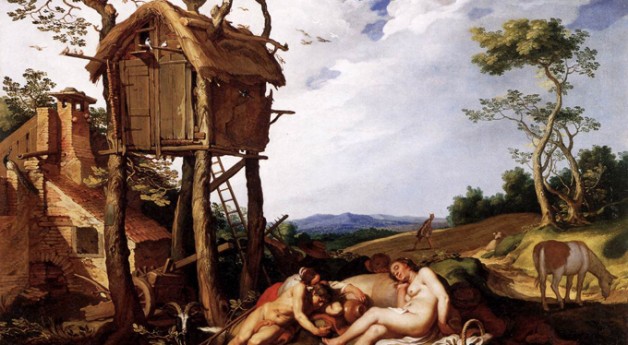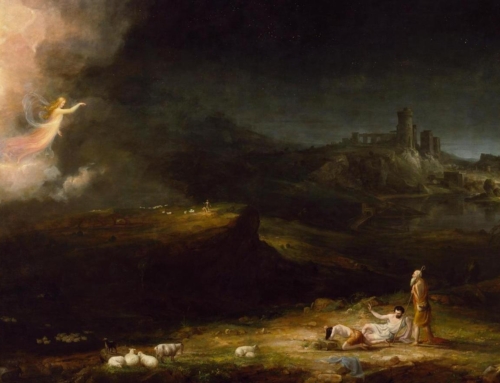And he taught them at length in parables…
—Mark 4:2
Yesterday we looked at prophecy in Scripture and saw that it needs to be interpreted in order to receive the message God is sending through it, and what that interpretation looks like.
That was the first of our three points about prophecy in Scripture:
1. that it needs to be interpreted;
2. that it reveals its message to some people while concealing it from others;
3. and that it has multiple layers of true interpretation and multiple true fulfillments.
To illustrate the second point, that prophetic messages reveal while at the same time concealing, let us look to a familiar example—the parables of Jesus. Jesus is, of course, more than a prophet, but his speech contains much that is in the tradition of the Old Testament prophets.
People often say that Jesus was a great teacher because he used examples in the form of parables that ordinary people in his time and place could relate to and understand right away.
But this conception of Jesus’ parables is not the whole story. If the message of the parables were obvious to all on the first hearing, then the Apostles and the majority of first-century Jews would have been astonishingly dimwitted, because they rarely seem to have understood Jesus’ parables. Or perhaps Jesus was just not a very good communicator, since nobody understood what he was saying! Neither of these explanations is satisfactory, so there must be something wrong with the assumption that the meaning of Jesus’ parables is immediately clear to all.
Actually, Jesus explained to the Apostles why he used parables, and they transmitted this explanation to us in the Gospels. It is perhaps not what we might assume.
And when he was alone, those present along with the Twelve questioned him about the parables. He answered them, “The mystery of the kingdom of God has been granted to you. But to those outside everything comes in parables, so that ‘they may look and see but not perceive, and hear and listen but not understand, in order that they may not be converted and be forgiven.'”
—Mark 4:10-12
This is perhaps a bit shocking, and it might even seem like Jesus is endorsing a Gnostic view that gives chaff to the common folk and true wheat only to the elite. But the truth of the matter becomes clear when we realize that the parables are a tool that God uses to reveal himself to all mankind—not just the select few.
Imagine if the ability to understand Jesus’ teaching depended primarily upon human abilities like wits, reasoning skills, and learning. Then the kingdom of God would belong primarily to those with powerful brains and good education. Instead, it is those who accept God’s gracious gifts of faith and charity who receive the interpretation of the parables and enter into their depths, irrespective of their natural intellectual abilities; the rest remain outside, no matter how learnedly they can pontificate about the hypothetical meanings of the parables.
Consider the many places in the Gospel of John where Jesus teaches by making some statement that on the face of it seems outrageous, as when he says that he will “destroy this temple and in three days rebuild it” (John 2:19), that he can give living water “welling up into eternal life” (4:14), or that can offer his flesh to eat as the bread of eternal life (6:55-58).
These enigmatic statements confuse Jesus’ listeners. For some, this confusion is an opportunity to be drawn into deeper understanding and intimacy with Jesus. When they admit that they don’t understand, he is willing to engage them and draw them to himself. For others it is an occasion to delude themselves further. When they refuse to admit their need, they keep themselves from him. And if they blame him or subject him to hostile interpretation, they end up opposing him.
Jesus is not a subject to be mastered, like algebra or chemistry, or a cosmic force to be figured out and controlled, like electromagnetism. He is a person with whom one either has a relationship, or not. And because he is a divine person, entering into a relationship with him will be on his terms and at his initiative, or it will not occur.
What lessons should we take from Jesus’ parables to our study of the prophetic visions of the Book of Revelation? The prophetic vision admits God’s friends who—by God’s grace—are willing to accept the true interpretation from him, but it screens out the unworthy, who refuse. As the first verse of Revelation says, the book is “the Revelation of Jesus Christ, which God gave to him, to show his servants what must happen soon” (my emphasis). Learning and scholarship and a good brain can help us a great deal if put at the service of our faith, but first and foremost we must respond to God’s self-revelation with faith and love, accepting the true interpretation from God.
Image: Abraham Bloemaert, Landscape with the Parable of the Tares Among the Wheat







